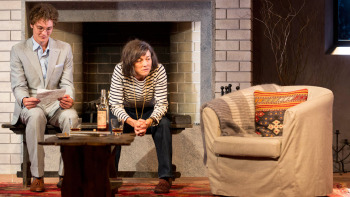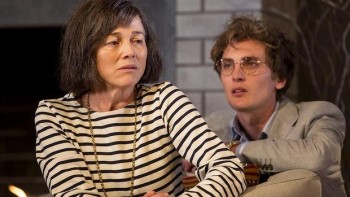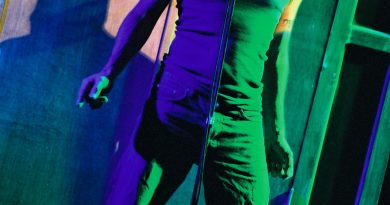Switzerland – Sydney Theatre Company
Joanna Murray-Smith’s new play Switzerland – a two-hander lovingly crafted in the image of Patricia Highsmith, exploring her last days – is an elegantly tense new play that is written so skilfully that you almost don’t realise quite how good it is. That it successfully pulls off its various twists and turns, that its dialogue crackles with venom and humour so effortlessly, is a significant achievement.
The set by Michael Scott-Mitchell is modelled after Patricia Highsmith’s (played by Sarah Pierse) own self-exiled house, and it glistens with a comfortable, lived-in authenticity. The costume design puts Pierse in a perfectly no-nonsense, strictly utilitarian trousers and shirt; a tip of masculine softened by her longish bob; quintessential early-90s without feeling ‘stereotypical lesbian’ (thank goodness). We can tell right away, from these signifiers, so much about this Highsmith: she is tough, she is remote, she is hard.
It feels so American, this play, even though – or perhaps because – this play so skilfully rails against the new America, the new New York, the bircher muesli and the pretension. It feels like something that might have been on Broadway in the last few years, shades of personal drama with wealth stacked on its side. It hums, in scenes of verve and insults, like Other Desert Cities or The Assembled Parties. Maybe that’s why everyone now is so sure this could be a movie, or a Broadway transfer after its season at the Geffen early next year.

Or maybe it’s just the first time in a while a play here has presented an American sensibility with American protagonists, with no need to broaden and soften for understanding or to placate the Australian market, or how it ignores that way we might have, sometimes, of making everything about us. There’s nothing distant or mystifying about this play or about Highsmith (her cantankerous misanthropy is loud and clear), but she feels of her world, rather than ours. Luckily, her world feels like the real world and thus feels like our world, so we can go there with her.
So we have the famous author Patricia Highsmith, self-exiled to Switzerland, alone in the Alps with books and show tunes and collectibles. She hates everyone, really, and everything – Jews, New York girls, pushy publishers, any peanut butter that isn’t her favorite. She is the ultimate example of being “set in her ways.”
When Edward (Eamon Farren), a nebbish publishing workhorse who is desperately in love with writers and the romance of writing, arrives at Highsmith’s home to beg her to sign a deal that will see her write her final Ripley (Of The Talented Mr. fame), Highsmith is an immovable object. She’s done with New York. she’s done with writing, she’s done with participating in the world. But Edward won’t leave until he’s changed her mind. How can you force a writer to write, when she doesn’t feel she can continue? How do you break up with a character and a world that you’ve built, piece by piece? How do we separate our love of those worlds and the author’s way with words from the author’s actual presence and personality?
This is a thriller in Highsmith’s footprints and honours her legacy so well that it would be a shame to spoil a single twist in a review. Suffice it to say it’s very difficult to be bored in this play – it runs for about 100 minutes without interval without feeling breathless or like it’s barreling its way past nuance towards the finishing line. It is absorbing, exciting, and a little frightening, because we don’t know how this one is going to end. It feels a little bit dangerous, and that’s perfectly delicious.
Director Sarah Goodes has embraced the uncertainty of the play’s conclusion and has deployed a deft sense of timing; the tone in earlier scenes is quick and playful, and some moments of vulnerability or character honesty that come later are slowed down, given space to unfurl slowly, drawing admissions and truths like bloodletting, like exploding, like pleading. It’s like music, though not as definitive as a complete arrangement. It’s tantalising in the way it refuses to give you an answer, like a song lyric that suddenly changes its rhyming patterns.

For some, the fact that a protagonist in a mainstage play at the Sydney Opera House is a lesbian will be a quiet moment of recognition and relief; with the exception of Belvoir’s Is This Thing On? last month, it’s almost impossible to find any kind of representation of gay women onstage. This relief will be further qualified by the fact that her sexuality isn’t a tragic or malevolent motivator for the plot (thatt’s an old, tired trope). There’s something so fresh about Highsmith just as a character in the theatre, but so much of her feels like a joint creation between Pierse and Murray-Smith.
There is one moment, before Pierse tells a story from her own life that’s like letting her guard down, and it’s so brief, and it’s right before a more exciting and intense moment grows between Pierse and Farren – but it’s one of the great acting moments on stage this year. Pierse softens, visibly, but in nowhere but her face. Her posture remains the same but something around her eyes, something inside seems to unclench with a feeling of hesitant liberation; she tells a story of someone she saw once out of a window and it’s like she’s given permission to talk about herself in a personal way. Just a moment, but a beautiful one, the kind that the best actors can use to change everything about a play, and with Switzerland Pierse proves to be such a fine actor. She seems so simpatico with Murray-Smith and her worlds; Pierse was also a force to be reckoned with in last year’s Fury, another Murray-Smith play.
Farren emerges throughout the course of the play and through this proves he, too, is an excellent actor; Farren moves through texts going from strength to strength across Australian stages, and in the past few years has gotten better, sharper, more chameleon-like. He more than holds his own with Pierse and there’s a great sense of togetherness in their work. Carrying a play on their own in the Drama Theatre space is a gargantuan task, but they are in it together and up for the challenge. Farren is marvellous, though it’s difficult to qualify his talent in this play in more detail without ruining the surprise of plot.
Switzerland is well written, tightly plotted, and genuinely thrilling.



